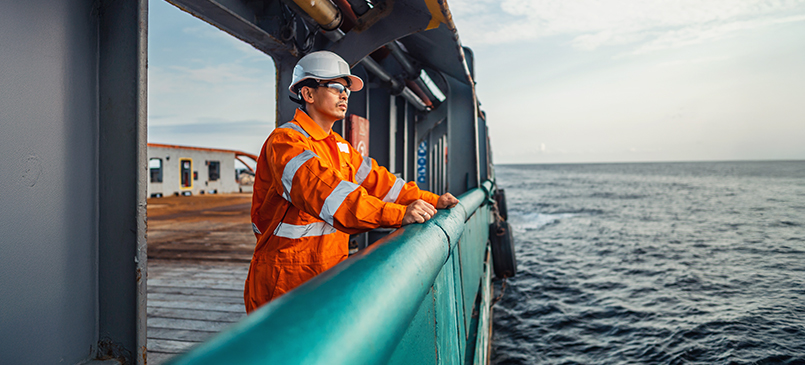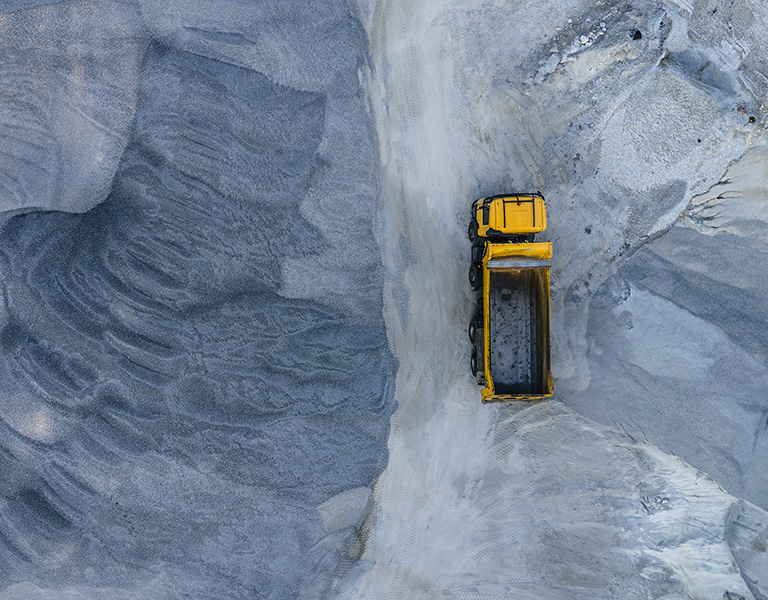TOXICOLOGY
Improving maritime safety with drug and
alcohol testing solutions from Abbott

Learn how Transafe B.V. enhances maritime safety and regulatory compliance using Abbott’s SoToxa™ system – a portable, accurate drug testing solution designed for onboard use.
Summary
Transafe B.V. is an independent company dedicated to maintaining high health, safety, environmental and security standards in the maritime industry. Founded in the Netherlands in 2000, it has since grown into a trusted partner for a variety of shipping companies, charterers, ports and government entities, primarily in Europe. One of Transafe’s services is alcohol and drug testing, a critical process for ensuring operational safety and compliance. The company works closely with its clients to ensure that all personnel involved in transporting hazardous materials are regularly tested for substance use. It relies on industry-leading testing solutions to help reduce risks and uphold safety standards on vessels and at terminals.
The importance of safety on board modern ships
Shipping is one of the world’s most international industries, and one of the most dangerous.1 While modern ships are significantly more robust than their predecessors, advances in design and engineering do not eliminate all risks. Vessels operate in inherently perilous conditions and face a wide array of threats, from harsh weather and mechanical failures to security risks.
The unpredictable nature of human error adds an extra layer of complexity to this picture, as even a minor miscalculation or lapse in judgement can lead to serious consequences.
These dangers become more pronounced when high risk cargo – like petroleum products and other high value chemicals – is involved, as any accident could have devastating consequences. The effects of such an incident could extend far beyond just the crew on board; marine ecosystems and global supply chains stand to suffer major disruptions.
In light of the many risks facing the maritime industry, strict international regulations are in place to govern vessels, their crews and the cargoes that they carry. At the forefront of these efforts for sea vessels is the International Maritime Organisation1 – a specialised agency of the United Nations – which has established clear guidelines to enhance shipping safety and security, while minimising marine and atmospheric pollution.
Additionally, oil companies launched the Oil Companies International Marine Forum (OCIMF) in 1970 in response to growing public concerns over marine pollution.2 While it was initially focused on seagoing tankers, OCIMF’s scope now also includes inland tanker shipping. The organisation promotes best practices in the design, construction and operation of tankers and offshore vessels, as well as in their interfaces with terminals located inshore, onshore and offshore. Major oil and shipping companies are highly aware of the risks involved in their work and the regulations in place to reduce them, and make significant efforts to adhere to best practices and implement rigorous safety protocols.
Drug and alcohol testing is a key safety measure that demonstrates their awareness of the critical role of human performance in maritime safety. Safety campaigns and regular testing protocols help to reinforce a culture of accountability and vigilance on board, and are one way to ensure that crew members remain fully alert and capable of making sound decisions, even in the most demanding conditions.
"Modern ships are well-equipped to withstand many maritime hazards, thanks to a double hull design that offers an added layer of protection in the event of a collision or structural failure. However, no vessel is completely immune to danger. That’s why strict compliance with safety regulations remains essential to safeguarding lives, cargo and the environment."
– Angelina Vlap, Internal Operations Manager at Transafe.
Ensuring onboard safety through routine and emergency testing
The Manila amendments to Section B-VIII/1 of the International Convention on Standards of Training, Certification and Watchkeeping for Seafarers (STCW) highlight that seafarers found to be under the influence of drugs or alcohol should not be permitted to perform watchkeeping duties or any tasks related to safety, pollution prevention or security until they are no longer impaired.3 The standards also emphasise the importance of establishing effective screening programmes to identify drug and alcohol use onboard. As a result, routine drug and alcohol testing has become a core component of maritime safety protocols. As part of these preventative measures, Transafe carries out mandatory testing for crew members of its customer companies at least once a year during scheduled inspections. The company also conducts immediate testing following any incident to determine whether substance use may have contributed to the series of events.
Vlap says: “Shipping companies need to adhere to testing regulations to remain competitive. Any company that refuses to conduct these inspections or exhibits high levels of non-compliance among employees will risk being blacklisted, preventing it from transporting cargo.”
“Our annual scheduled inspections serve multiple purposes. For example, they verify regulatory compliance, check whether the crew is fit for duty through testing, and allow for the quick and efficient collection of saliva samples – while keeping the results confidential. In the event of an incident, we also conduct immediate on-site testing to determine whether drug or alcohol use played a role. This rapid response is essential in maintaining accountability and ensuring safety in high risk environments.”
An efficient and reliable drugs analyser
Transafe has been using the SoToxa Oral Fluid Mobile Test System from Abbott for many years to deliver precise and reliable drug screening. This lightweight, compact and user-friendly handheld analyser enables rapid drug testing on board ships, at terminals and even on remote oil rigs. The SoToxa system is designed for easy portability, and is therefore particularly well suited to Transafe’s operational needs, allowing inspectors to travel across Europe by car, plane or helicopter to carry out testing. The analyser relies on oral fluid samples, which are easy to take in the field, and is therefore significantly less invasive than urine or blood tests. In addition, direct sample collection in the presence of an inspector helps to prevent evidence tampering, ensuring the integrity of results.
SoToxa can detect up to six drug classes to provide a clear picture of drug use up to 24 hours. These include:
- amphetamines;
- benzodiazepines;
- cannabis (THC);
- cocaine;
- methamphetamine;
- and opiates.
The system serves as an initial screening test, delivering on-site analysis with a clear printout of results within five minutes, and no further action is required if no substance is detected. However, if the result indicates ‘lab test required’, a second oral fluid sample is collected. The follow-up test needs to be processed in a laboratory, so it is securely packaged and sent to Abbott’s laboratory in Abingdon, UK, for detailed analysis, with final results typically available within five working days.
“Transafe has a longstanding relationship with Abbott. I have been working for the company for 14 years now, and the SoToxa analyser was in use long before that. It has several benefits, but the key advantage for us is that it’s a mobile system, so we can easily take it to the ships, rigs or ports, and receive test results within five minutes. We operate mostly in the area of Rotterdam, Antwerp and Hamburg, but sometimes we fly to other locations for testing, so portability is essential to us,” Vlap elaborates.
Partnering to achieve maritime substance testing
Transafe’s long-standing relationship with Abbott is built on trust, reliability and efficiency. The company values the laboratory’s swift turnaround times, as well as Abbott’s high quality service and responsiveness in addressing any technical issues. Their collaboration has been further strengthened by the recent introduction of local Dutch support, streamlining communication and ensuring any concerns are promptly resolved. In addition, Transafe relies on Abbott’s calibration service for its nine SoToxa analysers, which are sent to the service hub one at a time to prevent operational disruptions. This systematic approach to calibration and quality control ensures that the company’s testing equipment remains in peak condition while maintaining seamless testing operations.
“The Abbott team offers an exceptional service and is extremely quick to resolve any issues that we encounter, ensuring minimal disruption to our operations. That’s why we haven’t switched to another system. We have explored alternative analysers in the past, but none have matched Abbott’s combination of accuracy, lead time, service quality and responsiveness.”
An ongoing commitment to maritime safety
The maritime industry operates in a high-risk environment where safety depends on strict regulations and rigorous compliance measures. From extreme weather conditions to mechanical failures, shipping companies must continuously manage risks to protect lives, valuable cargo and the environment. While various strategies are used to mitigate these risks, drug and alcohol testing is a key measure in addressing the risk of human error, helping to ensure that crew members remain alert and capable of making sound decisions. With the help of the SoToxa system from Abbott, Transafe delivers fast, accurate and portable substance testing solutions that support both routine and post-incident employee screening, helping to manage risk, maintain regulatory compliance and ensure safer operations on board.
References
- International Maritime Organization. Safety. IMO. Accessed September 12, 2025. https://www.imo.org/en/OurWork/Safety/Pages/Default.aspx
- Oil Companies International Marine Forum. Guidelines for the Control of Drugs and Alcohol in the Maritime Industry. 3rd ed. OCIMF; 2024. Accessed September 12, 2025. https://www.ocimf.org/publications/information-papers/guidelines-for-the-control-of-drugs-and-alcohol-in-the-maritime-industry.
- Maritime Mutual Insurance Association (NZ) Ltd. 2024. SHIPBOARD DRUG & ALCOHOL ABUSE: STCW REGULATION AND RISK MANAGEMENT GUIDELINES. Maritime Mutual Risk Bulletin No.82. Accessed September 12, 2025. https://maritime-mutual.com/wp-content/uploads/2024/06/MMIA-bulletin-082.pdf.




